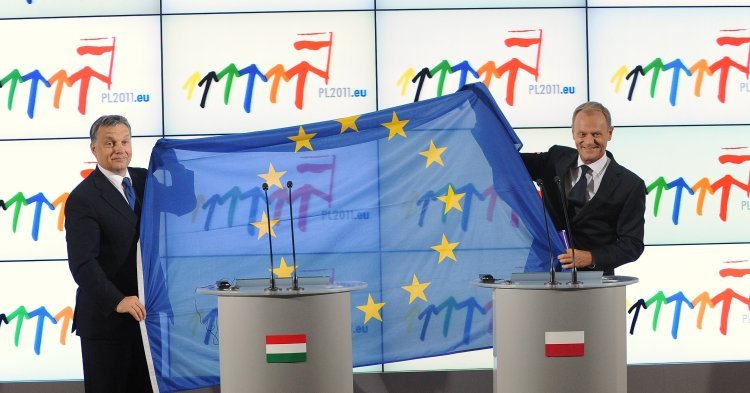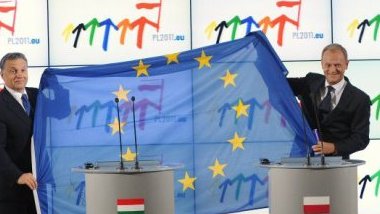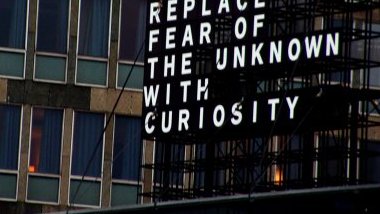Euromaidan set in motion a train of events whose great impact on the world nobody could predict. Ukraine is in turmoil, the Crimean peninsula joined the Russian Federation, the EU and the USA have started economic retaliatory attack and some even speak about the Cold War comeback. The crisis has chosen a bad timing for the European Union. We are still slowly recovering from the economic crisis, Euroscepticism is on its high horse, as the European elections confirmed. All these factors are endangering the European project and its future. Surpsisingly, this Ukraine crisis seems to be beneficial for the EU in the end. The fear of Russian expansionism, future aggreession and flasbacks of the Soviet Era raised votes in support of the European project in the Eastern Europe.
Since many Eastern European countries experienced Russian supermacy for decades, all were very concerned about the events in Ukraine. Particularly Poland and the Baltic states that have probably one of the worst experiences with the Russian ruling are calling for renewal of the NATO operational readiness and decisive punishment by the EU. Moreover, the polls and politicians show that Ukraine crisis made people there more supportive of the EU in order to secure their own safety. Eastern Europe Euroscepticism is in general more moderate than its western counterpart and Eurosceptic voices have been overshadowed even more by the current events.
The greatest political turn regarding the Europeans election took place in Poland. Before the elections, it seemed almost that Jaroslaw Kaczynski, the controversial and Eurosceptic leader of the Law and Justice (PiS) party, was heading for victory. The election was supposed to be focused on domestic and economic issues in which current Prime Minister Donald Tusk and his Civic Platform were loosing their footing. However, recent events in Ukraine got the Civic Platform to the lead, which was confirmed by their results (32.1%, although not far ahead of PiS, 31.8%, who won an equal number of seats - 19). The party stressed its membership in the European People’s Party (EPP) which gives them real power to influence the EU decisions, unlike PiS which belongs to the European Conservatives and Reformists (ECR). Civic Platform also gathered increased support thanks to Polish Foreign Minsiter Radek Sikorski, who was very visible on the EU scene since the very beginning of the crisis for heavily criticizing Russia. He is also one of the hot candidates for the position of High Representative for the EU Foreign and Security Policy.
The Baltic states, being the former Soviet republics, share the fear of Russian actions, too. There are concerns that in case of Ukraine crisis escalation, they are next in Putin‘s Soviet reunion. The governing parties in Latvia already announced the raise of defence spending to the 2% of the GDP, NATO jets and soldiers arrived in the country and question of restoring conscription has been rised. Regarding the director of the Latvian research company SDKS, “Many Latvians are happy to be part of the EU and NATO, because it gives them security against Russia.” However, the large Russian minority which count for 1/3 of Latvia’s population has never been much in favour of the EU and rather bonds with Russia. Polls show that many of those even support Crimea accession. However, ballots of this minority are supposed to be divided among 4 ethnic parties so the general electorate has not dramatically shifted in its attitude towards the EU.
The Ukraine crisis has no significant impact on the European elections campaign in Slovakia or the Czech Republic. The election fight is held on economic and domestic level. People do not feel personally affected by the Ukraine crisis or endangered by Russia‘ s actions here. Even though Slovakia is exposed to the potential and significant economic and political damage caused by imposing the EU sanctions on Russia –harming Slovak export and by providing reverse transit of the Russian gas for Ukraine „behind Russia‘s back“, people do not have grudge against the government. The situation was very well depicted by Slovak Minister of Foreign and European Affairs, Miroslav Lajčák: „Euroscepticism in Slovakia is just a pose which neither has nor can have rational foundations. We are receivers of the economic help and we benefit from the membership. The scepticism emerges just from the economic crisis because there are less resources to redistribute.“
In general, this is applicable on the majority of Eastern European countries whose membership still has far more pros than cons. Commenting on Eurosceptic complaints about the biggest EU imperfection - loosing state sovereignty, the New York Times publicist Timothy Ash said: „The world of 21st century will be the world of giants. In a world of giants, you had better be a giant yourself.“ Therefore, if Eastern European countries are not a part of the European giant, they could very soon became a part of Putin´s growing leviathan.



1. On 3 June 2014 at 18:35, by Richard Replying to: Ukraine crisis - killing Euroscepticism in Eastern Europe?
Replying to: Ukraine crisis - killing Euroscepticism in Eastern Europe?
It’s hardly a ringing endorsement of the European Union if it’s main attraction is simply being preferable to Russia. Poland, the Baltic and Eastern states were all notable by their lamentably low voter turnout numbers, espescially Poland (22.7%), the Czech Republic (19.5%) and Slovakia (13%). With the exception of Bulgaria scraping through by a mere 0.2%, none of these countries managed to convince more than 40% of their populations to vote in the EU elections.
Follow the comments: |
|
